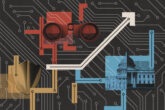May 24, 2024
Tort Law and Frontier AI Governance
The development and deployment of highly capable, general-purpose frontier AI systems—such as GPT-4, Gemini, Llama 3, Claude 3, and beyond—will likely produce major societal benefits across many fields. As these systems grow more powerful, however, they are also likely to pose serious risks to public welfare, individual rights, and national security. Fortunately, frontier AI companies can take precautionary measures to mitigate these risks, such as conducting evaluations for dangerous capabilities and installing safeguards against misuse. Several companies have started to employ such measures, and industry best practices for safety are emerging.
Frontier AI developers can take precautions to reduce the risks that their most advanced systems will increasingly pose.
It would be unwise, however, to rely entirely on industry and corporate self-regulation to promote the safety and security of frontier AI systems. Some frontier AI companies might employ insufficiently rigorous precautions, or refrain from taking significant safety measures altogether. Other companies might fail to invest the time and resources necessary to keep their safety practices up to date with the rapid pace at which AI capabilities are advancing. Given competitive pressures, moreover, the irresponsible practices of one frontier AI company might have a contagion effect, weakening other companies’ incentives to proceed responsibly as well.
Read the entire article from Lawfare.
More from CNAS
-
Technology & National Security
CNAS Insights | Unpacking the H200 Export PolicyAI Chips for China With two new policies, President Donald Trump has implemented his pledge to allow sales of NVIDIA’s H200 AI chips to China in exchange for a quarter of the ...
By Janet Egan & James Sanders
-
Technology & National Security
CNAS Insights | The Export Control Loophole Fueling China's Chip ProductionThis week, Reuters reported that China has apparently built a prototype of an extreme ultraviolet lithography (EUV) system, a highly intricate machine used to produce cutting-...
By Michelle Nie, Autumn Dorsey & Janet Egan
-
Energy, Economics & Security / Technology & National Security
Recommendations for Promoting American AI AbroadStrategic Context and Program Objectives The American AI Exports Program is an ambitious and essential proposal to expand the reach of American AI technologies in foreign mar...
By Janet Egan, Geoffrey Gertz, Daniel Remler & Ruby Scanlon
-
Technology & National Security
Prepared, Not ParalyzedExecutive Summary The Trump administration has embraced a pro-innovation approach to artificial intelligence (AI) policy. Its AI Action Plan, released July 2025, underscores t...
By Janet Egan, Spencer Michaels & Caleb Withers




